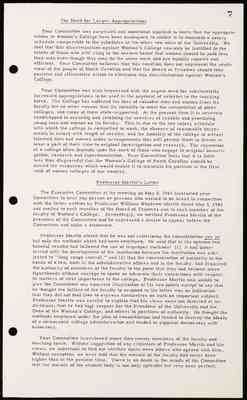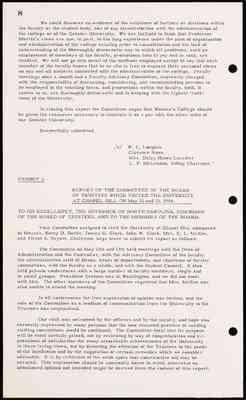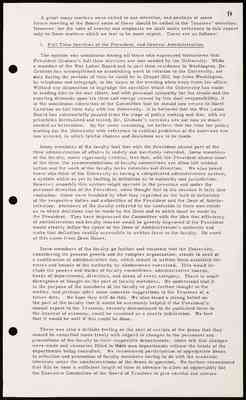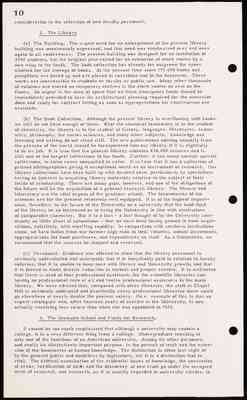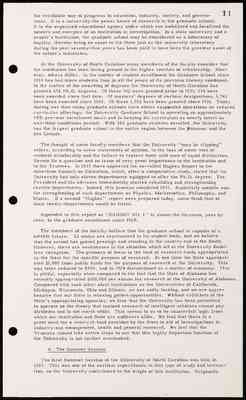Pages
The Need for Larger Appropriations
Your Committee was surprised and somewhat shocked to learn that the appropriations to Woman*s College have been inadequate to enable it to maintain a salary schedule comparable to the schedules at the other two units of the University. We feel that this discrimination against Woman's College can only be justified in the minds of those who still cling to the ancient belief that women should be paid less than men even though they may do the same work and are equally capable and efficient. Your Committee believes that this condtion does not represent the sentiment of the people of North Carolina and that the Board of Trustees should take positive and affirmative action to eliminate this discrimination against Woman's College.
Your Committee was also impressed with the urgent need for substantially increased appropriations to be used in the payment of salaries to the teaching force. The College has suffered the loss of valuable men and women from its faculty for no other reason than its inability to meet the competition of other colleges, and many of them state-supported. At the present time it is severely handicapped in securing and retaining the services of capable and promising young men and women on its faculty. This is due to the low salary schedule with which the college is compelled to work, the absence of reasonable increments in salary with length of service, and the inability of the college to attract talented men and women under arrangements that will permit them to devote at least a part of their time to original investigation and research. The reputation of a college often depends upon the work of those who engage in original investigation, research and experimentation. Your Committee feels that it is little less than disgraceful that the Woman's College of North Carolina should be denied the resources which would enable it to maintain its position in the first rank of women colleges of our country.
Professor Martin's Letter
The Executive Committee at its meeting on May 8, 1944 instructed your Committee to hear any person or persons who wished to be heard in connection with the letter written by Professor William Woodrow Martin dated May 1, 1944 and mailed to each member of the Board of Trustees and to each member of the faculty of Woman's College. Accordingly, we notified Professor Martin of the presence of the Committee and he expressed a desire to appear before the Committee and make a statement.
Professor Martin stated that he was not criticizing the consolidation per se but only the methods which had been employed. He said that in his opinion two baneful results had followed the use of improper methods! (1) it had interfered with the development of the institution because the institution was subjected to "long range control," and (2) that the concentration of authority in the hands of a few, both in the administrative offices and in the faculty, had impaired the authority of members of the faculty to the point that they had become mere figureheads without courage to speak or advocate their convictions with respect to matters of vital importance to the college. Professor Martin was unable to give the Committee any concrete illustration of his two points except to say that he thought the failure of the faculty to respond to his letter was an indication that they did not feel free to express themselves on such an important subject. Professor Martin was careful to explain that his views were not directed at individuals; that he had high respect for the President of the University and the Dean of the Woman's College, and others in positions of authority. He thought the methods employed under the plan of consolidation had tended to destroy the ideals of a democratic college administration and tended to supplant democracy with autocracy.
Your Committee interviewed more than twenty members of the faculty and teaching force. Without suggestion of any criticism of Professor Martin and his views, we undertook to find out whether there were others who agreed with him.. Without exception, we were told that the morale of the faculty had never been higher than at the present time. There is no doubt in the minds of the Committee that the morale of the student body is not only splendid but very near perfect.
We could discover no evidence of the existence of factions or divisions within the faculty or the student body, nor of any dissatisfaction with the administration of the college or of the Greater University. We are inclined to think that Professor Martin's views are due, in part, to his long experience under the plan of organization and administration of the college existing prior to consolidation and his lack of understanding of the thoroughly democratic way in which all problems, such as employment of members of the faculty, promotions both in pay and in rank, are handled. We will not go into detail of the methods employed except to say that each member of the faculty knows that he or she is free to express their personal views on any and all subjects connected with the administration of the college. Faculty meetings once a month and a Faculty Advisory Committee, expressly charged with the responsibility of discussing, considering, and recommending persons to be employed in the teaching force, and promotions within the faculty, both, it seems to us, are thoroughly democratic and in keeping with the highest traditions of the University.
In closing this report the Committee urges that Woman's College should be given the resources necessary to maintain it on a par with the other units of our Greater University.
Respectfully submitted, /s/ W. L. Lumpkin Clarence Stone Mrs. Daisy Hanes Lassiter L. P. McLendon, Acting Chairman "
EXHIBIT 2. REPORT OF THE COMMITTEE OF THE BOARD OF TRUSTEES WHICH VISITED THE UNIVERSITY AT CHAPEL HILL ON May 12 and 13, 1944.
TO HIS EXCELLENCY, THE GOVERNOR OF NORTH CAROLINA, CHAIRMAN OF THE BOARD OF TRUSTEES, AND TO THE MEMBERS OF THE BOARD:
Your Committee assigned to visit the University at Chapel Hill, composed of Messrs. Kemp D. Battle, James H. Clark, John W. Clark, Mrs. E. L. McKee, and Victor S. Bryant, Chairman, begs leave to submit its report as follows:
The Committee on May 12th and 13th held meetings with the Dean of Administration and the Controller, with the Advisory Committee of the faculty, the administrative staff of Deans, heads of departments, and chairman of faculty committees, with the faculty as a whole, and with the Student Council. It also held private conferences with a large number of faculty members, singly and in small groups. President Graham was in Washington, and we did not meet with him. The other members of the Committee regretted that Mrs. McKee was also unable to attend the meeting.
In all conferences the free expression of opinion was invited, and the role of the Committee as a medium of communication from the University to the Trustees was emphasized.
Our visit was welcomed by the officers and by the faculty, and hope was earnestly expressed by many persons that the now resumed practice of sending visiting committees would be continued. The Committee feels that its purpose will be most usefully gained, not by reviewing by way of congratulation and ex pressions of satisfaction the many remarkable achievements of the University in these trying times, but by directing the attention of the Trustees to the needs of the institution and by the suggestion of certain remedies which we consider advisable. It is by criticism of the weak spots that constructive aid may be secured. This explanation should be constantly borne in mind, otherwise an unbalanced opinion not intended might be derived from the content of this report.
9
A great many matters were called to our attention, and perhaps at some future meeting of the Board some of these should be called to the Trustees' attention. However, for the sake of brevity and emphasis we shall make reference in this report only to those matters which we feel to be most urgent. These are as follows:
1. Full Time Services of the President, and General Administration.
The opinion was unanimous among all those who expressed themselves that President Graham's full time services are now needed by the University. While a member of the War Labor Board and in part time residence in Washington, Dr. Graham has accomplished an astonishing work in relation to the University, not nnly during the periods of time he could be in Chapel Hill, but from Washington, by telephone and telegraph, in the hours of the evening when away from his office. Without any disposition to begrudge the sacrifice which the University has made in lending him to the war effort, and with personal sympathy for the strain and the exacting demands upon his time and energy caused by this dual responsibility, it is the unanimous conviction of the Committee that he should now return to North Carolina on full time duty with the University. It is believed that the War Labor Board has substantially passed from the stage of policy making and that, with its principles formulated and tested, Dr. Graham's services are not now so much needed as heretofore. By the same reasoning, we believe that the time for policy making for the University with reference to critical problems of the post-war era has arrived, in which fateful choices and decisions are to be made.
Many members of the faculty feel that with the President absent part of the time administration of affairs is unduly and inevitably retarded. Some members of the faculty, more vigorously critical, feel that, with the President absent most of the time, the recommendations of faculty committees are often left without action and the work of the faculty lacks cohesion and direction. We also heard those who think of the University as having a complicated administrative system, a system which as yet is lacking in definition as to authority and jurisdiction. However smoothly this system might operate in the presence and under the personal direction of the President, some thought that in his absence it falls into confusion. Some were troubled by what they regarded as the lack of definition of the respective duties and authorities of the President and the Dean of Admin istration. Members of the faculty referred to the confusion in their own minds as to which decisions can be made by the Dean and to which must be made by the President. They have impressed the Committee with the idea that efficiency of administration and faculty morale would be greatly improved if the President would clearly define the spere of the Dean of Administration's authority and make that definition readily accessible in written form to the faculty. No word of this came from Dean House.
Some members of the faculty go further and maintain that the University, considering its present growth and its complex organization, stands in need of a codification of administrative law, which should in written form establish the metes and bounds of the authority by whomsoever exercised. This would in clude the powers and duties of faculty committees, administrative boards, heads of departments, directors, and deans of every category. There is much divergence of thought on the part of faculty members. We understand that it is the purpose of the members of the faculty to give further thought to the matter, and perhaps offer some concrete suggestions to the Trustees at a future date. We hope they will do this. We also found a strong belief on the part of the faculty that it would be extremely helpful if the President's annual report to the Trustees, recently discontinued in its published form in the interest of economy, could be resumed as a yearly publication. We feel that it would be well if this could be done.
There was also a definite feeling on the part of certain of the deans that they should be consulted more freely with regard to changes in the personnel and promotions of the faculty in their respective departments. Some felt that changes were made and vacancies filled in their own departments without the heads of the departments being consulted. We recommend participation of appropriate deans in selection and promotion of faculty members having to do with the academic interests under the administrations of the deans in question. We further recommend that this be done a sufficient length of time in advance to allow an opportunity for the Executive Committee of the Board of Trustees to give careful and mature
10 consideration to the selection of new faculty personnel. Z.
The Library
(a) The Building. The urgent need for an enlargement of the present library building was unanimously expressed, and that need was emphasized over and over again in all conferences. The present building was designed for an institution of 3 000 students, but the original plan called for an extension of stock rooms by a new wing to the South. The book collection has already far outgrown the space allotted for the storage of books. At the present time some 135,000 books and pamphlets are boxed up and are placed in corridors and in the basement. These works are inaccessible to students or faculty or public use. Many other thousands of volumes are stored on temporary shelves in the stack rooms or rest on the floors. So urgent is the need of space that we think emergency funds should be immediately provided to have the architectural planning required for the extension done and ready for contract letting as soon as appropriations for construction are available. (b) The Book Collection. Although the present library is overflowing with books, we still do not have enough of them. What the chemical laboratory is to the student of chemistry, the library is to the student of history, languages, literatures, econo mics, philosophy, the social sciences, and many other subjects. Knowledge and learning and writing do not stand still. The new publications coming annually from the presses of the world should be incorporated into our library if it is rightfully to do its job. It is true that the general library contains 434,000 volumes and is still one of the largest collections in the South. Further, it has many notable special collections, in some cases unequalled in value. It is true that it has a collection of printed bibliographies giving it exceptional worth as an instrument of research. Our library collections have been built up with devoted care, particularly by specialists having an interest in acquiring library materials relative to the subject of their fields of scholarship. There are many gaps, however, and one of the obligations of the future will be the acquisition of a general research library. The library and laboratory are the vital organs of the graduate school. The laboratories of the sciences are for the present relatively well equipped. It is of the highest import ance, therefore, to the future of the University as a university that the book fund of the library be so increased as to bring the University in line with institutions of comparable character. But it is a fact - a fact thought of by the University com munity as little short of calamitous - that we have been losing ground in book acqui sitions, relatively, with startling rapidity. In comparison with southern institutions alone, we have fallen from our former high rank in total volumes, annual increments, appropriations for book purchases, and expenditures on staff. As a Committee, we recommend that the process be stopped and reversed. (c) Personnel. Evidence was offered to show that the library personnel is seriously understaffed and underpaid; that it is inequitably paid in relation to faculty salaries; that it is unable to keep pace with library and University growth; and that it is forced to make drastic reduction in normal and proper service. It is estimated that there is need of four professional assistants for the scientific libraries now having no professional care at all and twelve professional assistants in the main library. We were advised that, compared with other libraries, the staff at Chapel Hill is seriously underpaid and practically every professional librarian there could go elsewhere at nearly double the present salary. On e example of this is that an expert cataloguer who, after fourteen years of service at the University, is now actually receiving less salary than when she was appointed in 1928. 3.
The Graduate School and Funds for Research..
It cannot be too much emphasized that although a university may contain a college, it is a very different thing from a college. Undergraduate teaching is only one of the functions of an American university. Among its other purposes, and really its distinctively important purpose, is the pursuit of truth and the exten sion of the boundaries of human knowledge. The distinction is often lost sight of by the general public and doubtless by legislators, but it is a distinction that is vital. The critical examination of the evidential bases of knowledge, the correction of error, verification of dat&, and the discovery of new truth go under the accepted term of research, and research, as it is usually regarded in university circles, is
